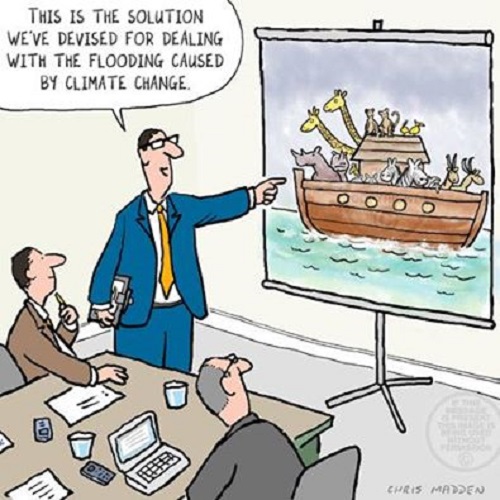
The Skeptical Science Facebook page will hit the impressive milestone of 10.000 "Likes" in the next day or two. If you have not vistied the SkS Facebook page recently, please take a couple of minutes to do so. A few weeks ago, Ari Jokimäki began posting, on a daily basis, links to recently published, peer-reviewed papers that address various aspects of climate science.

H/T to I Heart Climate Scientists Facebook page.
Jim Yong Kim, the bank's president, warned that climate change should not be seen as a future problem that could be put off: "The scientists tell us that if the world warms by 2C – warming which may be reached in 20 to 30 years – that will cause widespread food shortages, unprecedented heatwaves, and more intense cyclones.
"In the near-term, climate change – which is already unfolding – could batter the slums even more and greatly harm the lives and hopes of individuals and families who have had little hand in raising the Earth's temperature."
World's poorest will feel brunt of climate change, warns World Bank by Fiona Harvey, The Guardian, June 19, 2013
A new report, Turn Down the Heat: Climate Extremes, Regional Impacts and the Case for Resilience released by the World Bank on June 19, analyses the expected effects on South Asia and Africa if global temperatures increase by two and four degrees Celsius.
The report shows that a global temperature rise of two degrees Celsius will have a wide range of dangerous effects, including a loss of 40 to 80 percent of cropland in Africa and rising sea levels that will destroy significant parts of many coastal cities in South Asia.
John Cook gave a talk about recent climate research in which he expressed the continued warming of the planet in terms of Hiroshima atomic bomb detonation equivalents (four per second). This talk was featured in articles by The Sydney Morning Herald, The Australian, The French Tribune, The Herald Sun, The Age, 9 News National, SBS World News, News Talk ZB, and TVNZ.
Yahoo News and TakePart published an Op-Ed by John Cook about the phony debate over climate change.
Richard Sommerville referenced the 97% consensus in criticizing the San Diego media for false climate balance.
David Suzuki also referenced the consensus project on his blog, The Huffington Post, Rabble.ca, and Afnan.
World Bank President Jim Yong Kim also referenced the consensus project, as reported by Reuters.
Elizabeth May used Dana's Lu Blames Global Warming on CFCs (Curve Fitting Correlations) in an article for The Island Times.
Climate Progress re-posted Dana's Heartland's Chinese Academy of Sciences Fantasy.
Peter Sinclair referenced John Cook's talk at the recent Chapman climate communication conference.
Nick Fillmore referenced the consensus project in an Al Jazeera article.
The World Bank is a vital source of financial and technical assistance to developing countries around the world.
Two Institutions, One Mission
We are not a bank in the ordinary sense but a unique partnership to reduce poverty and support development. We comprise two institutions managed by 188 member countries: the International Bank for Reconstruction and Development(IBRD) and the International Development Association (IDA). The IBRD aims to reduce poverty in middle-income and creditworthy poorer countries, while IDA focuses exclusively on the world’s poorest countries. These institutions are part of a larger body known as the World Bank Group.
Established in 1944, the World Bank is headquartered in Washington, D.C. We have more than 9,000 employees in more than 100 offices worldwide.
Strategy
Six strategic themes drive the Bank’s work, focusing on the poorest countries, fragile and conflict-affected states, the Arab world, middle-income countries, global public goods issues, and delivery of knowledge and learning services.
There are also strategies for the key areas in which we work:
Financial Products and Services
We provide low-interest loans, interest-free credits, and grants to developing countries. These support a wide array of investments in such areas as education, health, public administration, infrastructure, financial and private sector development, agriculture, and environmental and natural resource management. Some of our projects are cofinanced with governments, other multilateral institutions, commercial banks, export credit agencies, and private sector investors.
We also provide or facilitate financing through trust fund partnerships with bilateral and multilateral donors. Many partners have asked the Bank to help manage initiatives that address needs across a wide range of sectors and developing regions.
Innovative Knowledge Sharing
We offer support to developing countries through policy advice, research and analysis, and technical assistance. Our analytical work often underpins World Bank financing and helps inform developing countries’ own investments. In addition, we support capacity development in the countries we serve. We also sponsor, host, or participate in many conferences and forums on issues of development, often in collaboration with partners.
To ensure that countries can access the best global expertise and help generate cutting-edge knowledge, the Bank is constantly seeking to improve the way it shares its knowledge and engages with clients and the public at large. Key priorities include:
Posted by John Hartz on Sunday, 23 June, 2013
 |
The Skeptical Science website by Skeptical Science is licensed under a Creative Commons Attribution 3.0 Unported License. |